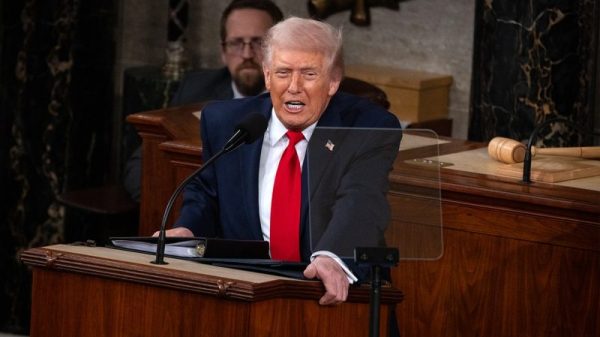One of the central arguments being made by President Biden as the presidential election nears is that American democracy hangs in the balance. The idea that Donald Trump poses a unique and significant threat to democracy has been a theme of Biden’s rhetoric since before his 2020 election, though he sharpened the argument significantly after the riot at the Capitol on Jan. 6, 2021, when Trump supporters attempted to block the finalization of Biden’s election.
New Washington Post-Schar School polling conducted in six swing states (Arizona, Georgia, Michigan, Nevada, Pennsylvania and Wisconsin) shows that confidence in democracy and American elections is lower among supporters of Donald Trump — but that voters in those states are more likely to say that Trump would do a better job addressing those concerns. Those most sympathetic to an authoritarian form of government, meanwhile, include demographic groups that have traditionally voted heavily Democratic.
The Post-Schar School poll included a number of questions aimed at evaluating views of democracy. They included:
Which candidate do you think would do a better job handling threats to democracy in the U.S.?
How satisfied are you with the way democracy is working in the U.S.?
How much do you trust that elections in the U.S. are fair?
Regardless of whom you supported in the 2020 election, do you think Joe Biden’s election as president was legitimate, or was he not legitimately elected?
There were also three questions specifically centered on evaluating views of systems of government. Respondents were asked whether certain forms of government were good or bad, including our current representative democracy (“a democratic system where representatives elected by citizens decide what becomes law”) and authoritarianism (“a system in which a strong leader can make decisions without interference from Congress or the courts”).
Most swing-state voters (79 percent) said that representative democracy is a good form of government. Just about a third, though, said authoritarianism would be.
Among the groups in those six states that were most likely to say that an authoritarian form of government would be good were voters who said they viewed the candidacies of both Biden and Trump with satisfaction. Nearly 7 in 10 of that (small) group said that such a form of government would be good. One of the highest percentages of people saying they thought an authoritarian form of government was good was those without a college degree, though more of them still said such a government was bad.
Hispanic respondents and non-White respondents overall were more likely to approve of authoritarian forms of government. On net, Hispanic respondents and Hispanic Catholics were more likely to say authoritarianism is good than bad.
Among the groups least supportive of authoritarianism were college graduates and those who identified NPR or major national newspapers as a main source of news.
The difference in the views of those who did or didn’t identify Fox News as a major source of news show the divergence between partisanship and support for authoritarianism. Fox News viewers were less likely than respondents overall to say they were satisfied with the state of democracy, that American elections are fair or that the 2020 election was legitimate. Those who didn’t cite Fox as a main source of news were more likely than respondents overall to hold those positions.
But Fox viewers held about the same views of representative democracy as non-Fox viewers and respondents overall. Nearly 4 in 10 said that authoritarianism would be good, with 6 in 10 saying it would be bad. That 20-point gap was about 16 points more favorable to authoritarianism than respondents overall.
Two of the widest gaps on questions about democracy came when considering age and vote frequency. Younger respondents and respondents who had voted less frequently in the past four national elections were more skeptical of democracy and generally more accepting of authoritarianism. Older respondents were more supportive of democracy and American elections.
There are a lot of ways in which this makes sense. Younger voters tend to vote less often, so there’s overlap between these groups. Non-White Americans are also less likely to vote and skew younger than White Americans. Older Americans were more likely to be around during the Cold War, when hostility to authoritarian forms of government was a central element of American foreign policy. Those who cite social media including Facebook and TikTok as a main source of news were more supportive of authoritarianism than respondents overall (though still negative on net). Those groups also skew young.
There are places where the responses to the questions about democracy show clear correlations across demographic groups. On the charts below, each circle represents a different subset of respondents, with circles scaled to the number of people in that group. If the dots generally fall along a line, that suggests some correlation between the two elements being considered.
For example, those who see Biden’s 2020 win as legitimate are more likely to say that Biden will do a better job protecting democracy. Those who see it as illegitimate think Trump will. Overall, most respondents in these six states see the 2020 results as legitimate — but also think Trump will do a better job protecting democracy.
Nearly half of respondents also said that Trump would try to rule as a dictator. One in 5 said the same of Biden. Six percent of respondents think both that Trump will be better at protecting democracy and that he will try to be a dictator.
Voters are not always entirely consistent.
Views of the legitimacy of the 2020 election also correlate to perceptions of how democracy is working. Respondents overall were dissatisfied with democracy but confident that 2020 was legitimate. Among the most Trump-supportive groups, satisfaction and confidence in the 2020 results were lowest.
There were other outliers. Double haters, respondents dissatisfied with both Trump and Biden as candidates, were a lot more dissatisfied with democracy than their views of 2020 would suggest. Hispanic Catholics and those satisfied with both candidates were more satisfied with democracy, too.
They were also groups that had more positive than negative views of authoritarianism. In general, less positive views of representative democracy correlated to more positive views of authoritarianism. Those groups, though, were outliers.
There wasn’t a similar link between views of authoritarianism and the 2020 results or even with trust in American elections generally.
One additional bit of positive news in this poll: Only 4 percent of those who say they definitely support Trump think that he will try to rule as a dictator if elected. Generally, respondents in these six states view authoritarianism negatively; very few people indicate that they plan to vote for someone who they think will try to implement authoritarianism.
But as Biden continues to press his case that Trump seeks that sort of power, the poll offers a different warning: Young voters and non-White voters in these states are less compelled by the dangers of authoritarianism than are other voters.
Emily Guskin contributed to this report.
One of the central arguments being made by President Biden as the presidential election nears is that American democracy hangs in the balance. The idea that Donald Trump poses a unique and significant threat to democracy has been a theme of Biden’s rhetoric since before his 2020 election, though he sharpened the argument significantly after the riot at the Capitol on Jan. 6, 2021, when Trump supporters attempted to block the finalization of Biden’s election.
New Washington Post-Schar School polling conducted in six swing states (Arizona, Georgia, Michigan, Nevada, Pennsylvania and Wisconsin) shows that confidence in democracy and American elections is lower among supporters of Donald Trump — but that voters in those states are more likely to say that Trump would do a better job addressing those concerns. Those most sympathetic to an authoritarian form of government, meanwhile, include demographic groups that have traditionally voted heavily Democratic.
The Post-Schar School poll included a number of questions aimed at evaluating views of democracy. They included:
Which candidate do you think would do a better job handling threats to democracy in the U.S.?
How satisfied are you with the way democracy is working in the U.S.?
How much do you trust that elections in the U.S. are fair?
Regardless of whom you supported in the 2020 election, do you think Joe Biden’s election as president was legitimate, or was he not legitimately elected?
There were also three questions specifically centered on evaluating views of systems of government. Respondents were asked whether certain forms of government were good or bad, including our current representative democracy (“a democratic system where representatives elected by citizens decide what becomes law”) and authoritarianism (“a system in which a strong leader can make decisions without interference from Congress or the courts”).
Most swing-state voters (79 percent) said that representative democracy is a good form of government. Just about a third, though, said authoritarianism would be.
Among the groups in those six states that were most likely to say that an authoritarian form of government would be good were voters who said they viewed the candidacies of both Biden and Trump with satisfaction. Nearly 7 in 10 of that (small) group said that such a form of government would be good. One of the highest percentages of people saying they thought an authoritarian form of government was good was those without a college degree, though more of them still said such a government was bad.
Hispanic respondents and non-White respondents overall were more likely to approve of authoritarian forms of government. On net, Hispanic respondents and Hispanic Catholics were more likely to say authoritarianism is good than bad.
Among the groups least supportive of authoritarianism were college graduates and those who identified NPR or major national newspapers as a main source of news.
The difference in the views of those who did or didn’t identify Fox News as a major source of news show the divergence between partisanship and support for authoritarianism. Fox News viewers were less likely than respondents overall to say they were satisfied with the state of democracy, that American elections are fair or that the 2020 election was legitimate. Those who didn’t cite Fox as a main source of news were more likely than respondents overall to hold those positions.
But Fox viewers held about the same views of representative democracy as non-Fox viewers and respondents overall. Nearly 4 in 10 said that authoritarianism would be good, with 6 in 10 saying it would be bad. That 20-point gap was about 16 points more favorable to authoritarianism than respondents overall.
Two of the widest gaps on questions about democracy came when considering age and vote frequency. Younger respondents and respondents who had voted less frequently in the past four national elections were more skeptical of democracy and generally more accepting of authoritarianism. Older respondents were more supportive of democracy and American elections.
There are a lot of ways in which this makes sense. Younger voters tend to vote less often, so there’s overlap between these groups. Non-White Americans are also less likely to vote and skew younger than White Americans. Older Americans were more likely to be around during the Cold War, when hostility to authoritarian forms of government was a central element of American foreign policy. Those who cite social media including Facebook and TikTok as a main source of news were more supportive of authoritarianism than respondents overall (though still negative on net). Those groups also skew young.
There are places where the responses to the questions about democracy show clear correlations across demographic groups. On the charts below, each circle represents a different subset of respondents, with circles scaled to the number of people in that group. If the dots generally fall along a line, that suggests some correlation between the two elements being considered.
For example, those who see Biden’s 2020 win as legitimate are more likely to say that Biden will do a better job protecting democracy. Those who see it as illegitimate think Trump will. Overall, most respondents in these six states see the 2020 results as legitimate — but also think Trump will do a better job protecting democracy.
Nearly half of respondents also said that Trump would try to rule as a dictator. One in 5 said the same of Biden. Six percent of respondents think both that Trump will be better at protecting democracy and that he will try to be a dictator.
Voters are not always entirely consistent.
Views of the legitimacy of the 2020 election also correlate to perceptions of how democracy is working. Respondents overall were dissatisfied with democracy but confident that 2020 was legitimate. Among the most Trump-supportive groups, satisfaction and confidence in the 2020 results were lowest.
There were other outliers. Double haters, respondents dissatisfied with both Trump and Biden as candidates, were a lot more dissatisfied with democracy than their views of 2020 would suggest. Hispanic Catholics and those satisfied with both candidates were more satisfied with democracy, too.
They were also groups that had more positive than negative views of authoritarianism. In general, less positive views of representative democracy correlated to more positive views of authoritarianism. Those groups, though, were outliers.
There wasn’t a similar link between views of authoritarianism and the 2020 results or even with trust in American elections generally.
One additional bit of positive news in this poll: Only 4 percent of those who say they definitely support Trump think that he will try to rule as a dictator if elected. Generally, respondents in these six states view authoritarianism negatively; very few people indicate that they plan to vote for someone who they think will try to implement authoritarianism.
But as Biden continues to press his case that Trump seeks that sort of power, the poll offers a different warning: Young voters and non-White voters in these states are less compelled by the dangers of authoritarianism than are other voters.
Emily Guskin contributed to this report.





















